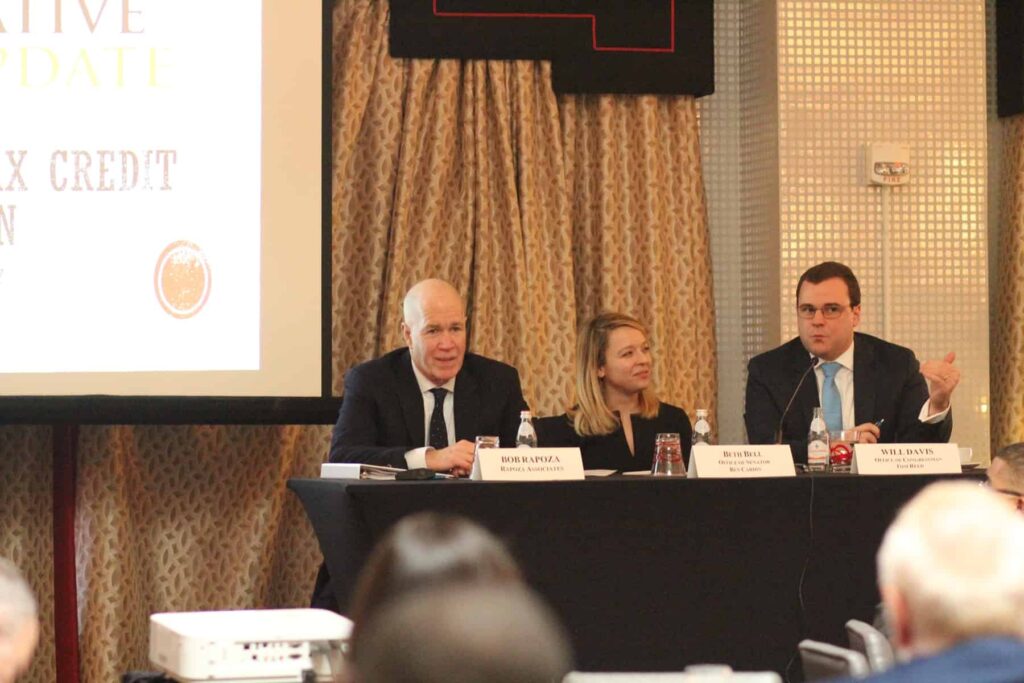NMTC Coalition Annual Conference attendees successfully pushed for the preservation of the largest federal incentive for investment in low-income communities
Last week, the New Markets Tax Credit (NMTC) Coalition held its New Markets Tax Credit Annual Conference in Washington, D.C. The event featured a newly released report on the NMTC’s economic impact, keynotes from NMTC champions Senator Roy Blunt (R-MO) and Representative Tom Reed (R-NY), as well as remarks from the Treasury Department’s Community Development Financial Institutions (CDFI) Fund Director Annie Donovan and City of Dayton, Ohio Commissioner Christopher Shaw.

The NMTC Coalition’s Board President Robert Davenport, emceed the event. A longtime NMTC practitioner and past president of the National Development Council, he highlighted the important timing of this year’s annual conference with Congress working to reconcile their tax bills, including the NMTC.
“This year’s conference came at a pivotal time for the NMTC community. The House tax bill was set to terminate the NMTC, while the Senate maintained the Credit’s current authorization for 2018 and 2019 that was provided in the PATH Act, which was passed in December 2015,” said Davenport. “The future of the NMTC—and the economically distressed rural and urban communities where it is invested—was hanging in the balance. Fortunately, the members of the conference committee understood the importance of the NMTC.”
Panels included senior Treasury and CDFI Fund staff, experts on NMTC and the law, a session on the use of the NMTC in disaster recovery and rebuilding efforts, and an investor roundtable. There was also a session on new reports on the NMTC, including an independent report by Summit Consulting, LLC that was commissioned by the CDFI Fund and released in August, as well as the third edition of the NMTC Economic Impact Report that was released by the Coalition on December 8th.

“Both of these recent reports on the NMTC clearly indicate that the credit is promoting economic revitalization in some of the poorest communities in America, far surpassing the statutory requirements. Further, the NMTC Economic Impact Report, which analyzed U.S. Department of Treasury data and survey data from 5,000 projects financed by the Credit, found that those NMTC investments created more than one million jobs and financed nearly 2,000 community services and facilities, including hospitals, schools, nonprofit service providers, and day care centers from 2003 to 2015,” said Bob Rapoza, spokesman for the Coalition.
Attendees at the conference were provided time to head to Capitol Hill and meet with their legislators on the NMTC. They shared examples of their work using the NMTC to attract private capital to distressed rural towns and blighted urban neighborhoods, generate economic activity, and create jobs and access to services needed by the communities where the credit is invested.
On the final day of the conference, reports surfaced that the tax reform conferees had agreed to adopt the Senate’s position and preserve the NMTC. On Friday, December 15th, House Ways and Means Committee Chairman Kevin Brady released the final text of the Tax Cuts and Jobs Act, H.R. 1.
The bill leaves the New Markets Tax Credit in place through 2019. The final text also repeals the Corporate Alternative Minimum Tax (AMT). The Senate-passed bill had included a corporate AMT rate of twenty percent, a proposal which would have created significant challenges for tax credits like the NMTC. Today, with a few technical changes incorporated, Congress will send the tax bill on to the President for his signature.
“NMTC investments generated more than $156 billion in economic activity in low-income communities from 2003 to 2015, which results in more than enough federal income tax revenue to more than cover the cost of the Credit. With that kind of track record, and a cost of just $1.7 billion over ten years, it was difficult to understand why the House proposed to terminate the New Markets Tax Credit in the first place. The NMTC is a great deal for the federal government, but most importantly it is a critical tool for our country’s small, overlooked rural towns and blighted urban neighborhoods that have been left outside of the economic mainstream for far too long. We applaud the conference committee for their work to maintain the Senate’s position on the NMTC and maintain the credit’s authorization for 2018 and 2019, as was agreed to in the bipartisan PATH Act that Congress passed in December 2015,”said Rapoza.





